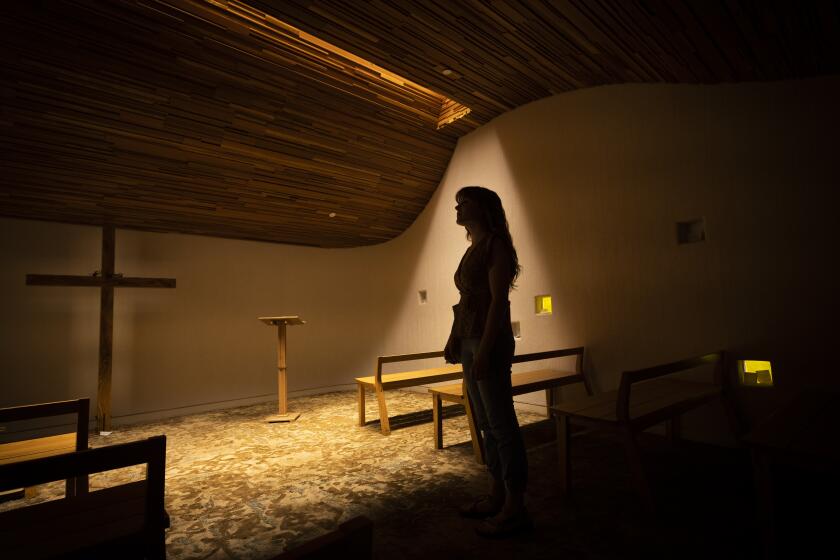Behind the story: Living outside the guardrails of faith
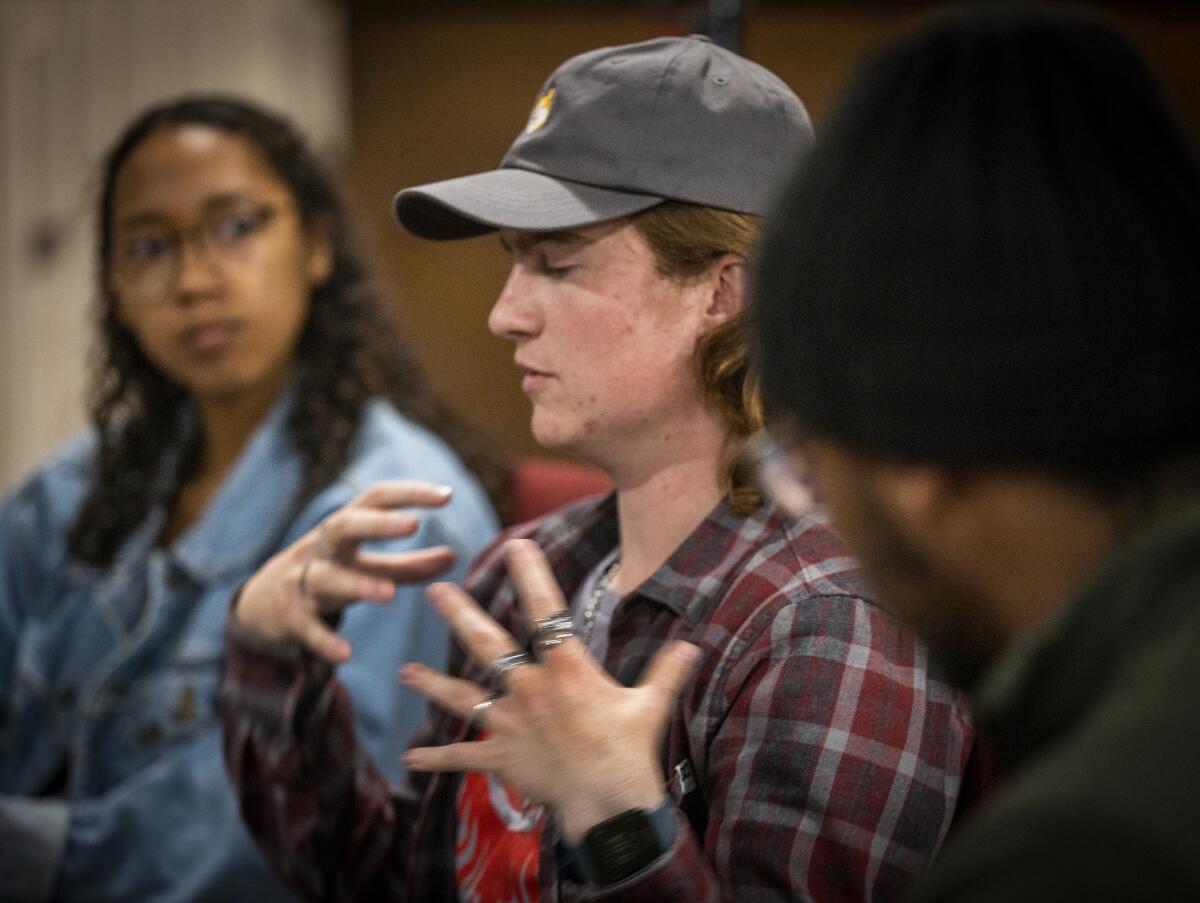
- Share via
When I first saw Caravaggio’s painting of St. Thomas in Florence many years ago, I was transfixed. Hunched over, incredulous, the apostle extends his hand as Christ pulls back his robe, revealing a lance wound left by a Roman soldier.
Having risen from the grave eight days earlier, Jesus provides instruction — “Put your finger here,” he said, according to St. John — and the doubting apostle obliges, burying his index finger, knuckle deep, inside the flesh.
Let others believe without seeing. Let others accept without proof. Not Thomas. He was a hard sell.
When I heard about students at a local Christian evangelical college who call themselves the St. Thomas Collective, I was intrigued. They pay respect to the saint who needed more than the word of others to bring him along.
I first met the collective on a foggy November night at a Methodist church in La Mirada. The parking lot was nearly empty, and if the encounter felt clandestine, their thoughtfulness was out in the open.
Here was a group of young adults who had inherited the faith of their parents at an early age before embracing it themselves. Now breaking ranks, they wanted more than what they had been given. If Thomas needed to see for himself, they needed to ask questions, even if questioning put the foundation of their lives at risk.
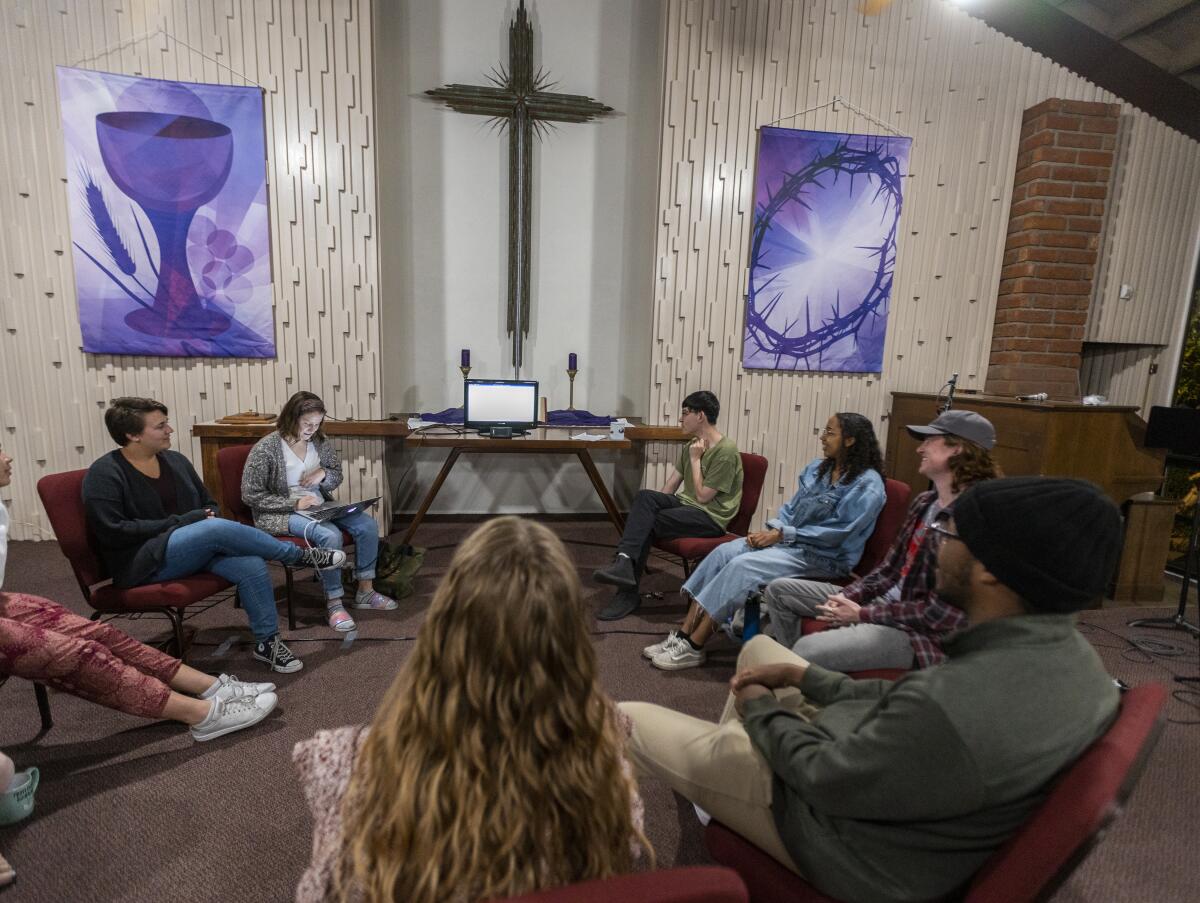
Sitting in their circle, I imagined them, as well versed in the Bible as they are, holding another book whose pages are empty and being in no hurry to start writing.
They initially wondered if speaking to me and going public with their skepticism would compromise their status at their college.
The campus community is close-knit, and Biola University requires students and faculty to sign a document affirming their commitment to its founding principles laid out more than 100 years ago. First and foremost is the declaration that the Bible “is the Word of God, a supernaturally given revelation from God Himself.” All else plays out from there.
They were concerned how their parents and friends might react. They said they feared being kicked out of their homes or being ostracized on campus, not unlike Thomas whom Jesus rebuked by blessing those “who have not seen and have believed.”
Biola University is facing growing disillusionment among young Christians who believe their faith should be more progressive and socially minded.
Eventually, though, the students agreed to share their stories, believing that by stepping out of the shadows, they might inspire others who have felt similarly alone with their questions, and as I listened to them struggle to accept what came so easily to some, I felt drawn in.
As someone who has not been baptized and whose churchgoing is less than occasional, I look upon faith with bewilderment, and yet I am not immune to its message of hope.
The world is a messy, frightening, anxious place, and amid the strife and sadness, I envy those who can lean upon anything that eases, if not explains away, the heartache and pain.
My work as a journalist has taught me that life is fickle and often veers toward tragedy. A grizzly bear, an aggrieved ex-husband, the arcing of power lines on a windy night can upend the most innocent expectations for any given hour.
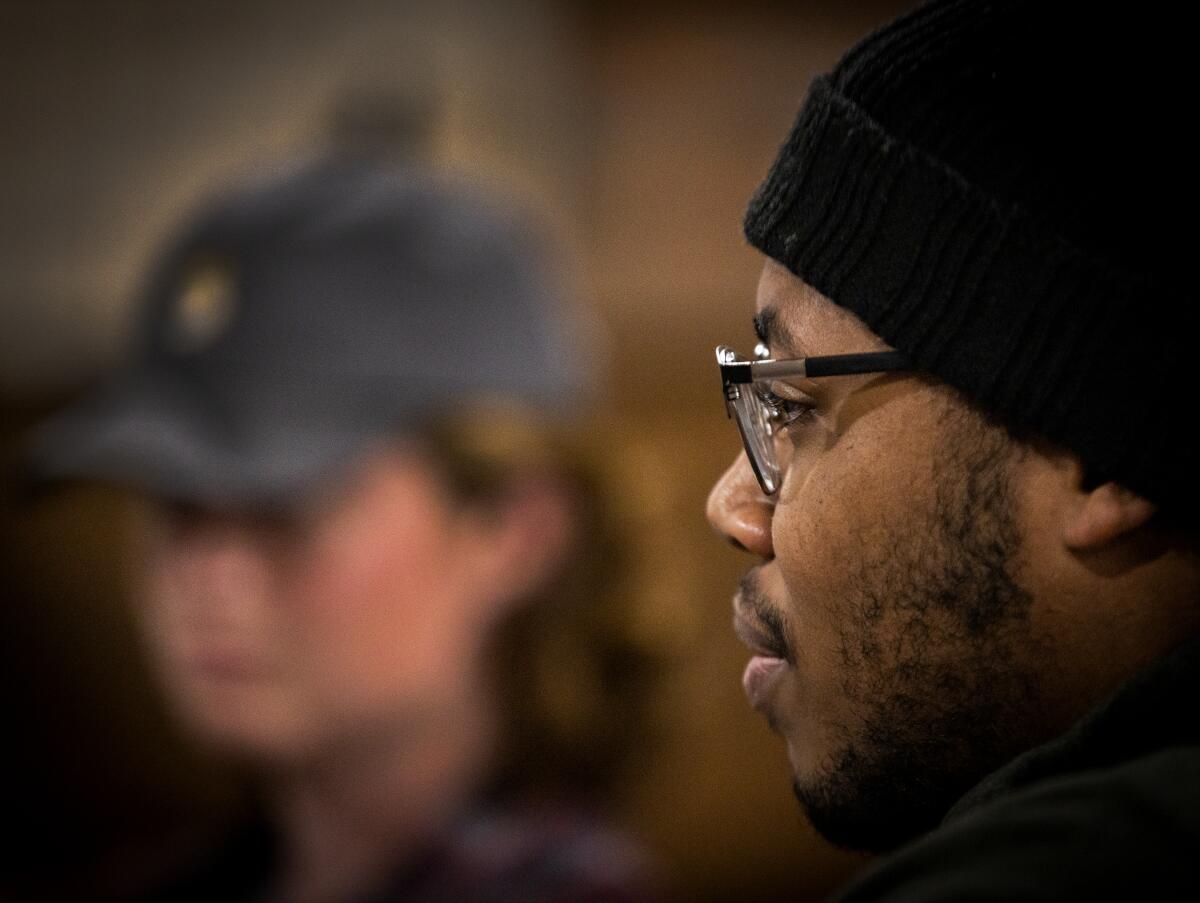
Treachery is hard to accept. Some find comfort in prayer. Others like me try to find the right words, as if by framing an ordeal in some kind of narrative, readers might come to a greater understanding and some sense of peace.
I am sure most writers and journalists can relate to this impulse. By answering the who, what, when, where, why and hows, we try to connect the dots and search for the language and syntax to explain the world to ourselves and to others.
Even though I am an idealist — I believe in stories and the written word — I also appreciate that these explanations are mostly an illusion. Human affairs are more complicated and devious than cause and effect suggest. No wonder news accounts are often referred to as only a draft of history.
But in my mind, this desire to bring quick order to chaos is humanity’s most sympathetic endeavor. It is hard to dismiss the search for meaning and the impulse to explain away mystery, which stories and religion try to do.
Caught between the promise of faith and science, I am less interested in proving what’s right or wrong than exploring the impulse to believe and take solace from conviction.
I do not agree, for instance, with those in some faith communities that global warming is a natural phenomenon not caused by man or that God is the intelligence behind the design of life, but I will not argue against these positions. Polemics is not my strong suit. I will instead marvel at what comes from accepting these as true: explanation and absolution.
The more I spoke with these students and read from their self-published anthology (varied writings from the poet Rainer Maria Rilke, the theologian Peter Rollins and others), the more I considered their courage, their willingness to look beyond, if not take down, the guardrails of faith beyond which lies the chaos of life, tragedy without reason, no heavenly intercession or reward.
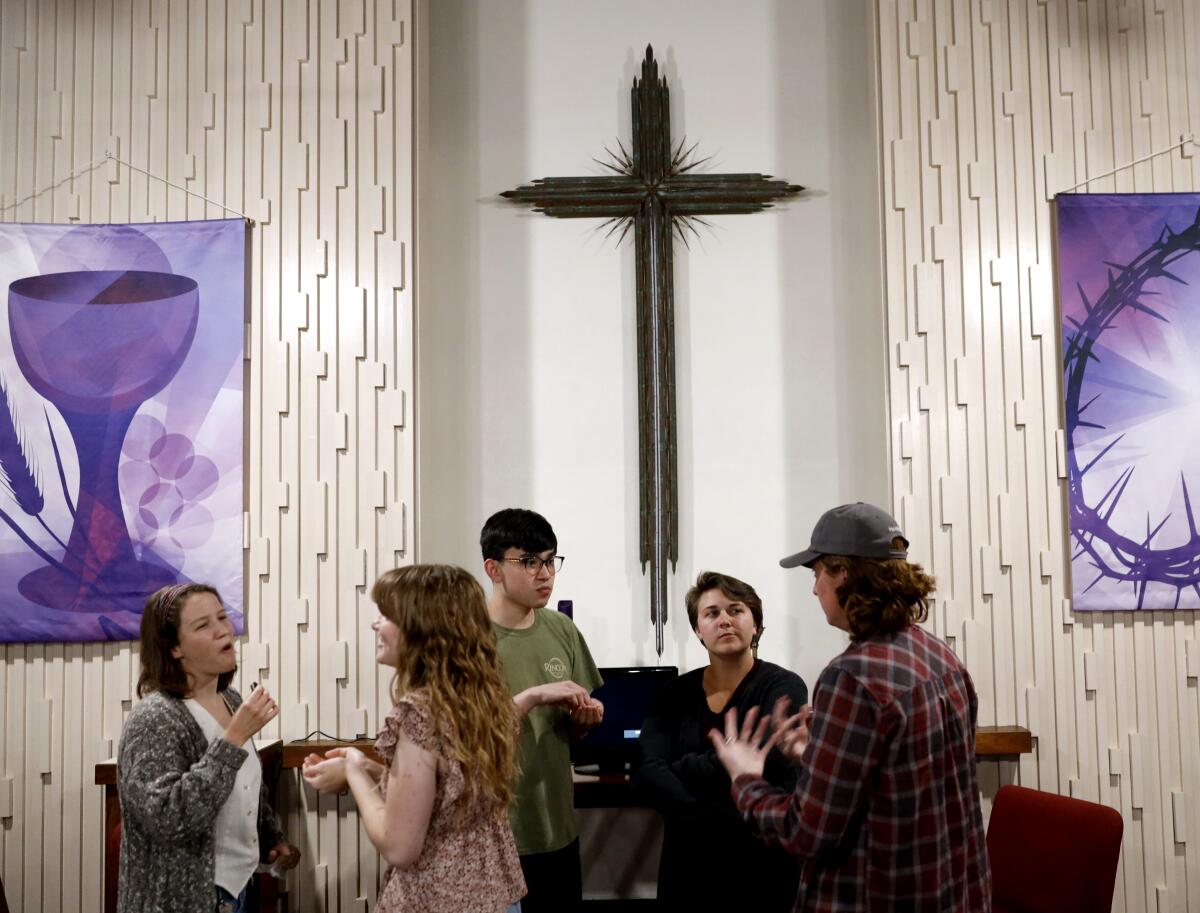
I know that faith is difficult, as any practice is, and I know there are many degrees lying between faith and doubt. Little in life is either/or. Still, I began to wonder who Thomas would have been had he never touched that wound.
Always doubting is uncomfortable, always questioning is disorienting; equivocating not very inspirational. But to live with doubt means accepting the sad, cruel, surprising and sometimes wonderful capriciousness of the world.
Doubt allows fear to become vulnerability, and as much as vulnerability is nothing we may want to court, it helps open the door to empathy, humility, tolerance.
And there is more. In doubt is the promise of possibility, of something yet to be revealed, something just beyond the end of this sentence and this short essay.
I don’t know what that is right now. I just know that I’ll try to keep the pages of that book empty for as long as I can.
More to Read
Sign up for Essential California
The most important California stories and recommendations in your inbox every morning.
You may occasionally receive promotional content from the Los Angeles Times.
